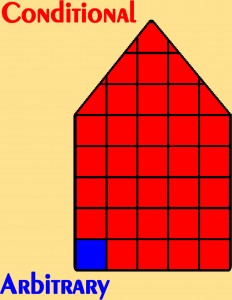Arbitrariness: The Cornerstone of Conditions

-
Arbitrariness & First, Second, Third
Arbitrariness is vital to intuitive problem solving because it’s related to subjectivity which is related to personality and its emotional drivers. Looking at the relationship between arbitrariness and conditionality will help us see this.
For instance, the concept of “first” does not need the existence of another number; however, the concept of “second” is dependent upon the condition that “first” exists, and the concept of “third” is dependent upon the condition that “first” and “second” exists.
House of Arbitrariness & Conditionality
Consider a house. Whereas someone can arbitrarily place the first stone of his house anywhere, the rest is built conditionally around that stone which is called the cornerstone. Ideas and knowledge are also built around cornerstones which we often experience as assumptions. Since knowledge influences how we identify, define and examine problems, our problems will have cornerstones too.
For instance, many of us consider the idea of democracy good. However, if such decision making is absolutely superb, why don’t companies and armies use it where more authoritarian styles dominate? This is because democracy’s cornerstone is placed in a governmental location. If we move that cornerstone to a corporate or military location, we will end up building a more authoritarian-style house.
In problem solving, moving the cornerstone to a new location will help us view our old location from a different perspective. But first, we must challenge ourselves to find the cornerstone of any set of conditions in which we find ourselves and the cornerstone of any set of ideas we are using to evaluate those conditions. That means avoiding an unquestioning, absolutist perspective and employing an inquisitive, arbitrary one.



The house metaphor is extremely useful. I hadn’t considered how relocating our assumptions to another context changes our assumptions — or rather, reframes them.
It is so easy to assume our assumptions are clear unquestionable truth. Changing the context can help us to sort that out.
Thank you, Douglas, for visiting, commenting and leaving your insights. I appreciate the compliment. You’re so right: It’s easy to assume our assumptions are truth. It’s also easy to upset folks when we question their truths as assumptions. Truth often is a side of that box outside of which we try to think. Unless we’re willing to question truths we may never really find out that they’re only assumptions. Labeling things as truths often discourages inquisitiveness and innovation. Thank you again for stopping by, Douglas. ~Mike